- Home
- Joy Dettman
Diamonds in the Mud and Other Stories Page 9
Diamonds in the Mud and Other Stories Read online
Page 9
‘Paul. This is overdue to come out.’ Purple is loud and assertive.
So, Reckless is Paul. There are two Pauls here. It’s a common enough name. John works in the same building as a Paul. Two Pauls live in Baker Street. Saint Vincent de Paul. Paul’s Icecream. St Paul’s Cathedral. Simon, John, Peter and Paul. For minutes she thinks of every Paul she has known in her life, tries to think of the Paul who was in Janet’s HSC class. Can’t visualise his face. Fly away Peter, fly away Paul.
The blow-dryer wails and the brush twirls and soon Purple’s purple hair is dry.
‘It looks fabulous,’ Reckless Paul lies. And Purple hands over sixty-five dollars while the coupon bearer’s brow burns. She scratches it with an index finger. The fingernail comes away red/brown. Her heart misses a beat, catches, pounds in her breast.
‘Excuse me,’ she says to anyone and no one. She points to her watch, waves her hand in the air as she’d once waved it in the classroom forty years ago. ‘Excuse me.’
Community property, bearers of coupons. The manager leads her to a basin. ‘Could you do this one for him, Penny?’
The broom placed against the wall, the broom girl approaches, hands held behind her. ‘I haven’t done one by myself yet.’
‘You’ll be right.’ And if not, it will be good enough for a bearer of coupons.
Soon there is no more time to think, listen or stare. Her eyes are closed tight, her index fingers plug her ears as water and shampoo trickle down her nose. The chair is too high, her toes curl down, attempt to grip the floor.
‘What are you doing with her?’ Reckless screams.
‘She was overdue to come out. Where have you been? We’re carrying you today, Paul, and you’ve got another one waiting.’
‘Who’s more important, me or a fucking family party? That’s what he has to decide, and I just told him so.’
And so the coupon bearer’s heart stops its futile beating. She’s been cooking and cleaning all week for that effing family party. This is the Paul, not the nice little blond with the smile and the gentle hands.
Water trickles beneath her black shroud as she stares at the many mooned ceiling, thinks, what a place to die. God, help me. God help me. God help me. No help there. God crossed her off his talk-back list twenty years ago.
A towel is draped like a black veil over her wet locks – there is nowhere to go, so she retreats into the mirror, breathes in, out. In. Out. In. Out.
‘So, what are we doing with . . . this?’ Like a magician removing a rabbit from a hat, Paul exposes the tangled mass of drooping curls, then with a flourish lifts a clump high.
She recognises contempt when she hears it, sees it. In the mirror, she shrinks a little more. ‘Just . . . just the split ends, please.’
‘Where do we begin, madam?’ he taunts his cringing prisoner. ‘This needs a full treatment.’
‘I’ve got the coupon from –’
‘Coupon? I don’t do coupons!’ His words are screamed, and all heads turn while she grabs for her purse, removes the crumpled paper, offers it, but she is facing him in the mirror and the coupon hits against non-giving glass.
‘I told them at reception . . . I showed it . . . to her.’ Impotent words, they bounce back, wound her.
‘Well who’s doing your hair, I’d like to know? I’ve given you the permanent rinse and the special price today is sixty-five dollars, madam.’
The coupon bearer only has fifty dollars in her worn grey purse and she still has to buy cream, strawberries, cocktail onions.
In the mirror Paul’s mouth moves, but she is looking beyond it to another mouth, to her own, lips compressed, jaw tense to hold back the tears. Tries to move her lips. Can’t. Tries hard to hide her pain.
Hello out there, Katherine Cooper. Are you still with me? The mirror lips part, expose teeth, large, white, strong. Once we were strong enough. Once, long ago before we became fools, clinging to archaic values and morality, we were strong enough. This new world has no morality and no values. The weak go down, drown without a bubble.
‘Penny. You can blow this one off. I’ve got a customer waiting.’
Her ice heart lurches, lunges at rib walls. Can’t get through, old prisoner heart. But ice under pressure can explode. Then watch those fragments fly.
‘No,’ her mirror mouth replies. ‘That coupon entitles me to a cut, rinse and blow-wave, and my appointment is with you.’
‘You should have told me you had the coupon.’
‘You should have looked at the appointment book. It is your mistake, not mine.’
‘I do not make mistakes, madam.’
‘Then chalk this one up to experience, you ill mannered, nasty little –’
He smiles, takes up his scissors, lifts a clump of uncombed hair and snip. Thirty centimetres of her crowning glory falls to the floor as he hisses in her ear. ‘You think I don’t know who you are, you stupid old cow?’ In the mirror, his mouth is ugly. But his teeth are small.
‘You think I don’t know who you are?’ she says. ‘You’ll hear from my solicitor for that.’ Or from my daughter.
She is standing, the better to evade his scissors, and to rip off that black shroud, to toss it in the face of her tormentor, and surely Peter’s old sneakers squeal their approval on the tiles.
The black and gold salon stills, until the little blond male steps between them.
‘Sit down, sweetie,’ he says. ‘And you go and cool off, Paul.’ He replaces the cape. ‘Don’t take any notice of him, sweetie. He’s having man trouble.’
Ears full of water, head full of tears and fears and anger, she doesn’t hear his words, but she sits, because she can’t go to the supermarket looking like this. Strawberries. Pickled onions. Cream, and mixed nuts. More dry biscuits to go with the dips. A fruit platter might be nice. Easy enough to prepare.
He talks, combs the tangled hair, tut-tuts over the missing clump, but his hands are gentle. ‘He’s been a prize bitch since his man called off tonight. He’s been taking it out on everyone.’
His man? My Peter is only a boy, my boy.
He’s studying her face in the mirror, showing her the shorter, rough-cut length. ‘I’ll have to level it up, sweetie, layer it. I hope that’s what you wanted.’
No use shaking her head. A thread once cut cannot be rejoined. She sits, eyes closed, while he does what he has to, combs, snips, talks.
‘Anyway, he was supposed to tell his wife that he was leaving her last Christmas . . . ’ Didn’t notice the change of subject. Concentrate, Katherine Cooper.
‘They got a flat together, on South Bank, before Christmas, and he hasn’t told her yet. Anyway, Paul swears he’s going to crash the party tonight.’
Same conversation, but altered scenario. This is a different Paul, not the Paul. It can’t be the Paul. Janet, who is never wrong, has got it wrong. Oh, pity the poor wife, oh pity her, but rejoice for one mother.
‘We can leave the fringe long, sweetie. You’ve got a high brow. You need a long fringe. Chin up a bit for me.’
Thank you God. Thank you God. Am I back on your list?
She relaxes, lifts her eyes to the speaker’s reflection, meets his eyes for a moment. Trusts his eyes and his hands, so closes her own eyes. The relief is enormous. Her feet reach for a place of comfort. Her neck and shoulders relax as the scissors snip-snip, and those gentle hands work on her hair while his voice soothes her soul.
‘They’re having the party at the house and he knows where they live – used to go to school with the daughter, who is a real bitch, apparently. Anyway, a few weeks ago, she found out about them –’
FIGHT three weeks ago? She sits rigid in her chair, stares at the speaker’s reflection in the mirror, but his focus is on her hair.
‘Head down a bit, sweetie.’
Peter worked with his father until three weeks ago. John and Peter. Peter and John.
Tell her, Pete, or I will.
It would kill her. Leave it alone until after the party. Just s
tay out of it, Jan.
Her eyes are wide open now. Her mouth is also open. The locked closet door is opening.
John didn’t want the party this Saturday. Big game on. Put it off for a week, he said. John was initiated into the game by Paul, who works . . . somewhere in his building. Paul from somewhere in the building phones often. Three nights a week they meet to . . . to play competition bowls? Since Christmas, they travel often to the country to play . . . competition bowls?
Lie.
She looks at her hands, and at the cluster of rings on her finger: engagement, wedding, eternity. They are lies too. All of them. She bought that expensive eternity ring with hard-won babysitting money and leftover housekeeping – paid it off at the jeweller’s, picked it up the day before her twenty-fifth anniversary party. Told her friends and family John had bought it.
Lie. John has never wasted one red cent on her. In almost thirty years, he’s bought her one cheap engagement ring and one wedding band – now worn thin.
‘His man bought the tickets before Christmas and paid a fortune for them – two hundred and fifty dollars each. And, get this. He leaves it until this morning to tell Paul he has to cancel out. Tells him to take someone else to the show. He must have known the party was on, sweetie. It was a rotten thing to do.’
‘Terrible,’ she murmurs, but her chin is low, he can’t see her smile.
The wail and warmth of the drier is mesmerising, the brush working hard at taming her curls while in the gilt framed mirror Katherine Cooper, the aging butterfly, sits beneath her black cocoon, waiting to emerge. The closet doors flung wide, she is mentally sorting through the items kept safe inside. Like those three months after Janet was born when John didn’t touch her, when he slept in the spare bed. They’re in the closet. And those frequent business trips ten years ago, and the eleven hundred dollars spent in Sydney when he was supposed to be on a business trip for his firm – and the five hundred spent at a jeweller’s in Melbourne. She’d waited for that gift, bought too late for Mother’s Day, too early for her birthday, but she’d waited for it anyway, and when it hadn’t come, she’d hidden her fear in the closet, with the despised wedding photographs of him, handsome boy, and her, newly shorn woolly sheep. ‘Baaaa,’ he’d said when he’d seen that photograph, and he’d laughed.
‘All done, sweetie. You look like a new woman.’
The manager/owner is standing behind her. She’s borrowed a lot of money to fit out this salon. Doesn’t need bad publicity. ‘It suits you,’ she says. ‘He’s given you a great cut.’
The coupon bearer looks at the floor, at the mountain of dark red frizz. She’s afraid to look in the mirror. A brief glance up and she sees a stranger with short hair and a long wispy fringe. Her hands feeling for what is missing, she stands, stares at the stranger in the black cape, who looks ten years younger, thinner in the face.
‘I . . . It’s not golden blonde?’
‘No, it’s not, sweetie. He’s given you the plum red, but it does look absolutely fabulous on you.’
‘I . . . I asked for the golden blonde.’
‘It’s the second time he’s done that today.’ The manager looks at the clock. ‘We can do a bleach, but not tonight. We’ll do it first thing on Monday morning.’
‘I asked for the golden blonde.’ Parrot.
A parrot is colourful. A parrot does not wear blue shantung. Blue is for the caged budgie.
The workers are staring, the broom girl leaning on her broom. Only Paul is smiling, and she wants to wipe that smile from his face. Instead, she turns again to the mirror. You look good in there, Katherine Cooper. You look too good to become a fishwife, fighting over a worthless catch.
‘It’s not what I asked for, so I won’t be paying,’ she says.
‘We wouldn’t expect you to. So, will I book you in for Monday at eight-thirty?’
‘I won’t be coming back,’ she says and the soles of Peter’s old sneakers squeal their approval as she walks, head held high, from the salon, her fifty dollars intact.
In the supermarket, a redhead eyes her from the shining scales, stares at her from the mirror over the freezer, from the shop windows as she hurries towards the bus stop weighed down by supermarket bags. But she changes her mind in front of Cash Converters, carries her load in to dump on the counter.
The guy likes the eternity ring, offers half of what she paid for it, but it is second-hand goods. He’ll take the engagement ring too – though he offers a pittance. He doesn’t want the wedding ring – nor does she. She leaves it on his counter.
Night is coming down in Melbourne when she boards her bus. The supermarket bags are heavy, as is her worn grey purse, but her head feels light. She nods to her reflection in the bus window, smiles, thinks, that feisty redhead will look great in her psychedelic shirt.
Her Name is Karli
The vinyl seat and I have become one, welded together by perspiration. Six long hours of driving behind me and I am almost there, almost home.
The town slinks out of a flat red landscape, its dusty trees sprinkling dusty shade on dusty walls. Tin roofs glare as I pass, small windows stare, trees still gossip about me; I tell stories of my home town but I edit them well and polish each word.
Same garage on the corner – Johnny used to work there, used to dream big dreams of owning it one day. For an instant I see myself entering that dark place, finding him still tinkering with his old ute. But he is married now, and not the reason I have returned. I am here to see my mother, and for her to see me as the businesswoman I have become, not as the weeping child who ran from her anger.
She is not expecting me. My trip is a spur of the moment thing – I had no time to write, and she has no need for a telephone.
Her farm is five miles from town. As I cross over the bridge the old boards complain at my passing. No red carpet rolled out for me, but the road raises a cloud of red dust.
Same warped old wooden gate. It carps at me when I open it, slams hard behind me, aiming for my heels. I know it well. I dodge its bite. But Lord, how Pete’s willow trees have thrived. Planted on either side of the home track, their green suggests a place of peace and serenity. A dreamer, my brother Pete, a weaver of childhood magic, but his avenue of willows, unlike the fairytales he told me and my sister, lead only to the abode of the wicked queen.
She is working in the garden but she hears my car and looks up, her old hat pushed back, one hand lifted to shade her eyes.
A mist blurs my vision. I want to believe in fairytales. I want to run to her, place my head on her breast and cry, look at me, see me, love me for what I am, not for what you wanted me to be. As I cover the ground between us, my arms reach out, but tentatively.
‘Wonders will never cease,’ she says. One step away. One step back. ‘You could have warned me you were coming.’ Slowly my arms fall to my sides. The script long writ is unchanged, unchangeable. ‘I suppose you want a cup of tea.’
‘I’ll make it.’ For a moment I watch her tending obedient vegetables, her old hat bobbing there, faded straw amid the green, then I turn and walk alone to the kitchen.
Tea in the same canister, I measure it into the same chipped enamel pot, lift the same heavy black kettle, but I find new mugs. My mother enters and takes the cake tin from the pantry, cuts two slim slices. Same old fruit cake. We sit at opposite ends of the table and for an hour she speaks of the weather, and of who died, and how they died, but by four thirty polite conversation wanes and she begins her questions.
Ah, I am saved by the truck rattling into the yard, by the dog barking. She takes a cigarette from her pack on the mantelpiece, lights it. I turn away from her smoke and walk to the window. Pete and a new dog are checking out my car. Pete turns, sees me waving, then walks quickly towards the house.
‘G’day.’ His head is inside. ‘What are you doing back here?’
‘Just passing. Thought I’d pop in.’ My smile is wide, real.
‘There’s tea made on the hob,’ Mother says. ‘Wipe
your filthy feet before you step into my kitchen.’
He wipes his feet, but walks through the kitchen to his room, returning with a book, which he hands to me. The cover shows a woman feeding her lover grapes. It looks new, but a business card advertising farm equipment marks. Mother’s back is turned. She is mean peeling potatoes at the sink, so I am free to scan the story that begins.
The name of the author has a familiar ring. My brother’s name is Peter James Adams. The author’s name is James A Peters. My mouth opens, my finger points.
‘You?’
‘I’m the culprit, or Mum thinks so.’
With a toss of her head, Mother leaves the room. We wait until she is in the bathroom and the shower running, then I add more tea and water to the pot and we talk and we laugh, but quietly, and we steal thick wedges of cake, drink tea, old friends, good friends, Pete and I.
He writes my name on the book, signs it with a flourish. ‘I bought twenty copies. They cost more than I got paid for the story, but what the hell, eh? They’re my proof that I can do it, my licence to do it, Deb.’ He speaks quickly and I listen, aware he has been starved of an ear in which to pour his dreams, but she returns, sits at the table and he is silent again.
‘You’re not married,’ she states. I wear no ring on my third finger.
‘No.’
‘Where are you living?’
‘In a flat, not far from the city.’
‘Alone?’
‘No.’
‘You’re living with a man?’ Her words are innocent enough but her expression screams whore.
Pete reads her expression. ‘She just got here, Mum.’
I place my hand on his arm. ‘I don’t live with a man.’ He is embarrassed by my touch. People in this house never touch. Love in this house is never spoken.
‘Who is she?’
‘Her name is Karli.’
‘Carlene?’
‘Karli,’ I say clearly, then I spell the name.
‘Karli? What sort of a name is that?’
‘Australian.’
‘They all call themselves Australians these days, don’t they? You know what I mean. Where did she come from before she was an Australian?’

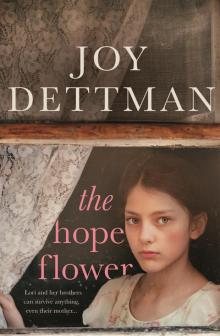 The Hope Flower
The Hope Flower Trails in the Dust
Trails in the Dust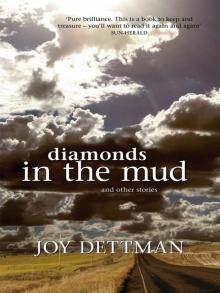 Diamonds in the Mud and Other Stories
Diamonds in the Mud and Other Stories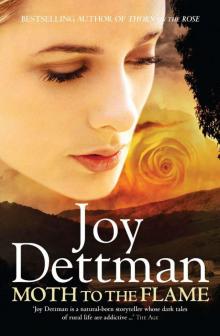 Moth to the Flame
Moth to the Flame The Tying of Threads
The Tying of Threads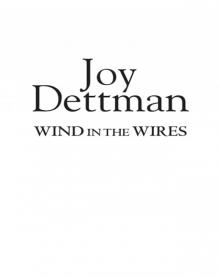 Wind in the Wires
Wind in the Wires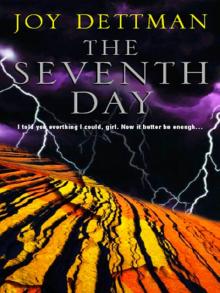 The Seventh Day
The Seventh Day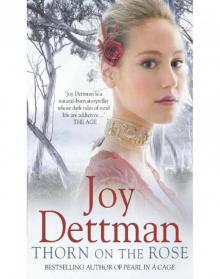 Thorn on the Rose
Thorn on the Rose Jacaranda Blue
Jacaranda Blue Mallawindy
Mallawindy Ripples on a Pond
Ripples on a Pond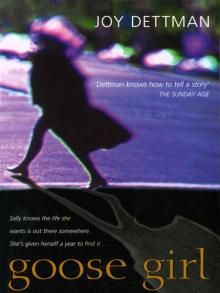 Goose Girl
Goose Girl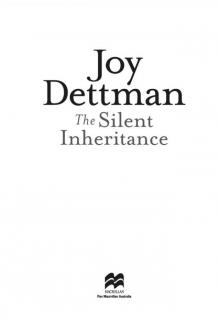 The Silent Inheritance
The Silent Inheritance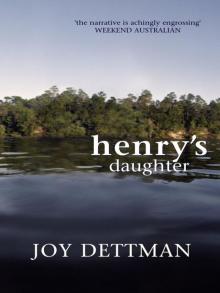 Henry’s Daughter
Henry’s Daughter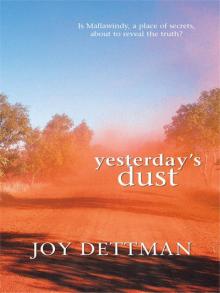 Yesterday's Dust
Yesterday's Dust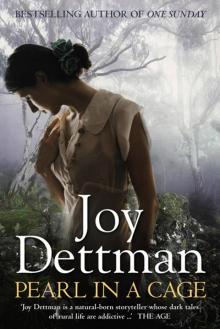 Pearl in a Cage
Pearl in a Cage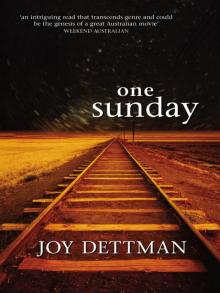 One Sunday
One Sunday